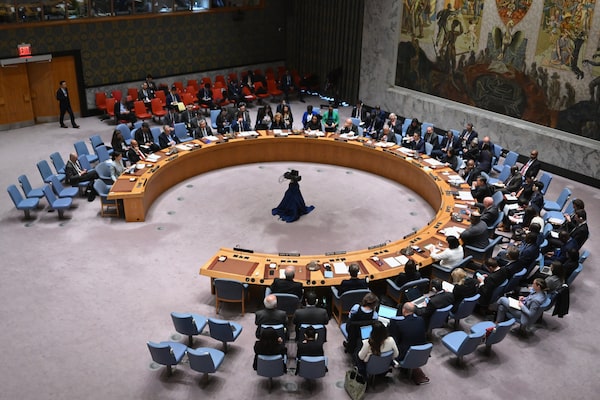
The United Nations Security Council meets on the situation in the Middle East at UN headquarters in New York City on April 18.ANGELA WEISS/Getty Images
The United States and Britain have imposed new sanctions on Iran, as Western leaders rush to deepen diplomatic reprisals in hopes of dissuading Israel from taking military revenge for an Iranian attack this past weekend.
The sanctions are directed toward individuals and entities connected to Iran’s manufacture of drones, which were a major part of the April 13 attack. In total, Tehran launched more than 300 missiles and drones, nearly all of which Israel and its allies shot down.
The U.S. Treasury Department announced on Thursday that its measures target 16 individuals and two entities enabling Iran’s drone production, including engine types that power Iran’s Shahed drones, which were used in the attack.
Britain said it is sanctioning seven individuals and six entities, including Iran’s Armed Forces General Staff and its Islamic Revolutionary Guard Corps Navy.
European Union leaders also pledged this week to step up sanctions against Iran. And finance ministers and central bank governors of Group of Seven countries said in a joint statement after a meeting on Wednesday that they would “ensure close coordination of any future measure to diminish Iran’s ability to acquire, produce, or transfer weapons to support destabilizing regional activities.”
The diplomatic effort is aimed at constraining an Israeli counterstrike that could thrust the region into a calamitous conflict. But the tightening sanctions showed little sign of securing calm. Instead, rhetoric has escalated, with threats from people in both countries that future attacks could be directed toward nuclear facilities.
The attack did little damage, but it was an unprecedented direct Iranian assault on Israel, with an estimated 60 tonnes of explosives synchronized to strike at about 2 a.m. Sunday.
Iran said it acted to avenge the deaths of some of its military leaders, who were killed in an Israeli strike on what Iran called a diplomatic compound in Syria.
Israel has yet to respond, although its leadership has twice prepared – and then aborted – military action against Iran since the attack, ABC News reported, citing Israeli sources.
“Israel will retaliate, and strongly,” former Mossad intelligence chief Zohar Palti told Sky News. He dismissed the idea of restraint, asking whether the U.S. would have heeded such calls after Pearl Harbor.
“They have to face the consequences,” he said, adding that the list of potential targets in Iran is likely to include nuclear facilities.
“Everything is on the table right now,” he said.
Iran, too, warned it had such facilities in its sights. “We know exactly where the enemy’s main nuclear sites are,” Ahmad Haghtalab, a commander in charge of Iranian nuclear security, said in comments carried by the Tasnim news agency, which is controlled by the Islamic Revolutionary Guard Corps.
“Hands are on the trigger to fire powerful missiles for the total destruction of determined targets,” he warned.
In the immediate aftermath of Iran’s attack, some in Israel cast doubt on the necessity of retaliation. But attitudes have hardened as the country has taken stock of the immensity of the Iranian barrage.
“It’s clear the Israelis are making a decision to act,” British Foreign Secretary David Cameron said after a visit to Israel this week, calling on the country to be “smart as well as tough.”
For Israeli Prime Minister Benjamin Netanyahu, a delayed response to Iran provides time to rebuild some of the global solidarity Israel enjoyed after Oct. 7, when Hamas attacked Israel, killing about 1,200 people. That solidarity has eroded in the following months as Israel has waged war on Hamas in the Gaza Strip, where local authorities have counted nearly 34,000 deaths.
Firas Yaghi, a former senior official with the Palestinian Legislative Council who is now a political analyst and expert in Israeli studies, said Mr. Netanyahu is seeking international support for his broader aims in Gaza, which include lessening pressure for a two-state solution to the long-simmering conflict between Palestinians and Israelis.
“Striking Iran is Netanyahu’s dream,” he said.
“Israel will not allow Iran to have the upper hand in the region.”
Mr. Netanyahu cannot delay for too long, lest he lose the punitive power of responding in a way that makes clear Israel will not tolerate being the target of such an attack, said Eldad Shavit, a former research and assessment leader for the Israel Defence Forces Intelligence Corps and the Israeli Prime Minister’s Office.
Iran, he said, has “broken the rules and done something they have never done before.”
“To restore deterrence, you have to retaliate.”
With a report from Reuters